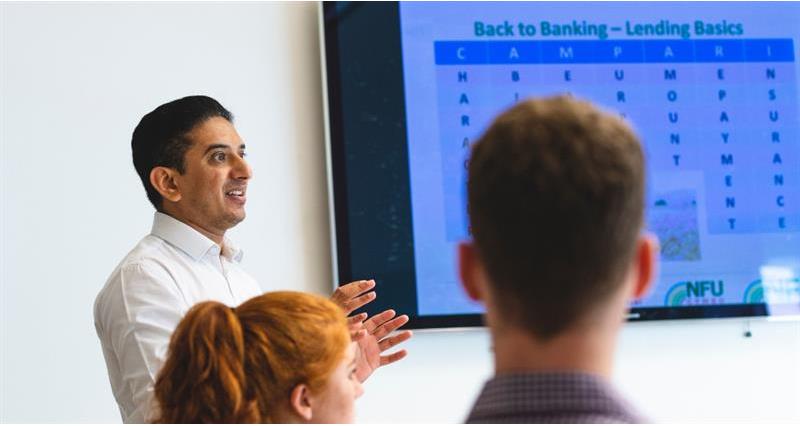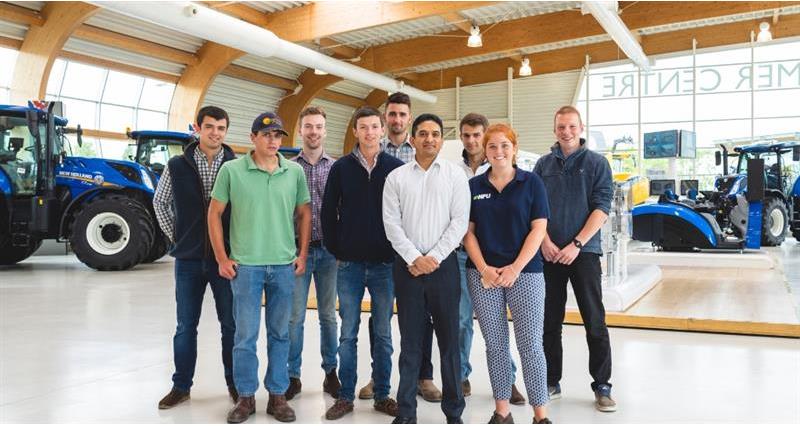Since 1964, the Basildon plant has been producing some of the most popular tractor models ever made: from the Ford 4000, 5000 and 7000 to the modern day T6, T7 and T7 Heavy Duty tractor models. Being the only UK Plant, its size is pretty impressive: spanning 40 hectares with around 1,000 employees on the site and around 500 working in the factory. So from the moment we pulled up outside the plant, we knew we were in for a sick day.
All systems go
On the factory floor you really get a sense of the scale of the plant – it definitely blew us away. The assembly line is 2.5km long – that’s, like, one long step, 2,500 times – taking the machine from the driveline as just a transmission and rear axle, to a complete tractor that can drive away. It really is a team effort, as the workman at each section of the line has just 4.5 minutes to attach all of their components before moving onto the next. Just to make it even harder, no two tractors are the same as each is built to meet a specific order, with its specification chosen from amongst 16,000 options.
Components are brought to Basildon from all over the world, for example, the transmission and rear axles are manufactured at the New Holland factory in Belgium. These British-made tractors are then exported to around 120 different overseas markets, including the USA, Australia and China.
Getting it right
Machinery can be a large investment area for your business but it can really make a difference to farm productivity. However, when you’re spending so much money, you really want to make sure you pick the models that are best for your business. Luckily for us, the New Holland team had two of their newest tractors round the corner waiting for us to test-drive.
We were let loose on a T6.175 DCT and T6.175 AutoCommand, and the staff was able to answer all of our questions and point out the key benefits of each model. Sitting in the tractor, surrounded by the latest gadgets and technology, it was hard to imagine that it took just 15 hours to put this all together. And no matter how often you’ve driven one; there was still something quite exciting about speeding around their test track in some pretty impressive kit.
Financing the Future of Farming
When you’re setting up your career in farming, or maybe expanding a business in the future with the purchase of some new machinery, it can be pretty expensive. One way to do it is by securing a bank loan, but even if you were lucky enough to have a Farming Business module at college (and you didn’t doze through it) few young farmers actually know how to approach a bank manager to secure that loan. So, NFU Economist Anand Dossa joined us for the day to talk us through investments and systems bankers may use to assess lending propositions.

Anand’s advice:
Agriculture is one of the foundation industries in a strong and robust economy with food production playing a key role in the growth and wealth of a nation. It’s the bedrock of the British food and drink industry, which is the largest manufacturing sector in the country, worth £111 billion and employing 3.9 million people. I believe with the right conditions and a favourable future domestic agricultural policy, the sector has the potential to build on this impressive performance.
However, extreme price volatility weighs particularly heavily on farm businesses. It impacts on farm profitability and investment. Uncertainty is already weighing heavily on farmers’ minds, lowering confidence and influencing investment decisions today. Farmer confidence is absolutely critical to the future of a profitable and productive food and farming sector. Confidence feeds through to investment on farm. Making investment decisions for the long term, for example, in buildings and other farm infrastructure, against a backdrop of increased political uncertainty, is challenging.
The NFU has set out its vision for a future domestic agricultural policy, outlining three cornerstones: environment, volatility and productivity. Under this policy we are advocating an ambitious programme that focuses on providing targeted investment. For many farmers, investment will be crucial if they are to meet the productivity challenges, manage volatility and seize opportunities during the sector’s biggest transformation in 45 years.
Looking ahead, the need for farming businesses to invest has never been greater. The NFU’s Banking Forum has been working hard to build stronger relationships with the banks and the financial institutions. It is important that the financial institutions recognise the importance of investment and that farming can look forward to continued financial support for such a vital sector in the future as we leave the EU.
What did the students think?

Howard Samm said "As a recent graduate, I am now looking at every aspect of how to plan my future career path within agriculture. Days like this are always a great way to get to know other like-minded people, gain insights on potential jobs, and to build up contacts. The talk from Anand Dossa was excellent in painting the picture for the future of British farming, and what way that may be heading. New Holland have had to change with the times and adapt by making the new heavy duty tractors, it’s always good to see how businesses adapt to 'future-proof' themselves."
Ed Dowler said "I found the trip around the factory floor incredible. Seeing the logistics behind making 85 tractors a day was mind blowing, the whole work force each plays a crucial role in the smooth running of the tractor assembly. It was really interesting to hear from Anand about how farmers’ attitudes can affect the success of their businesses and how to approach a bank for a financial loan."
Liam Watson said "The day was an amazing day out and the best part of the day for me was tour round the factory as I thought they built them all in one go but they are built to order from a 16500 spec sheet. I would strongly recommend becoming a NFU Student Farmer member as there is so much to learn and different meetings to go to. You are treated the same as a full NFU member and the benefits are incredible."
